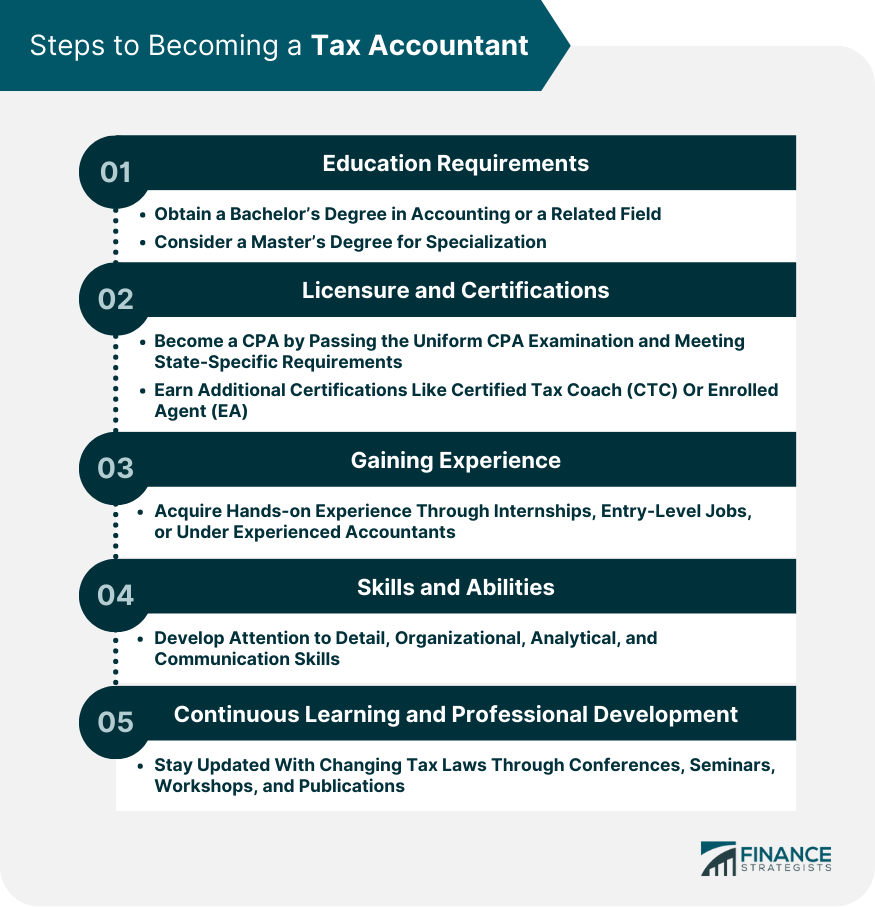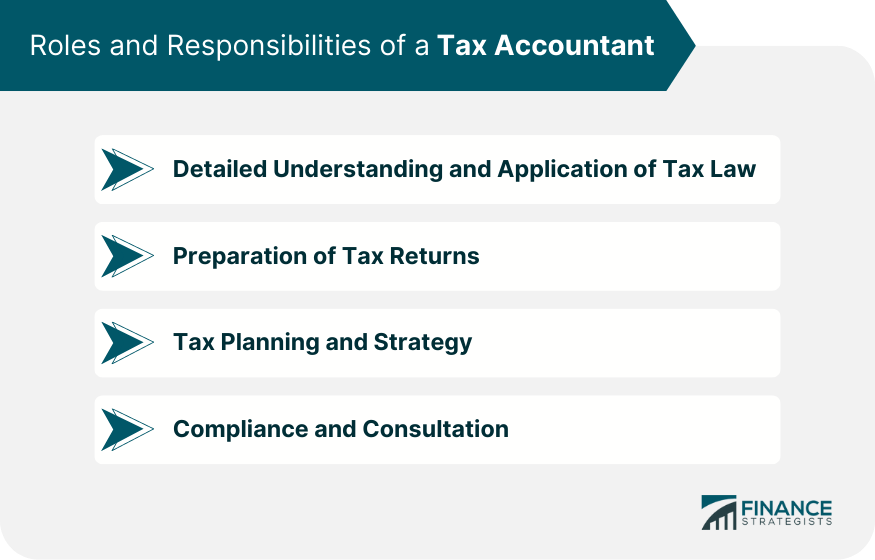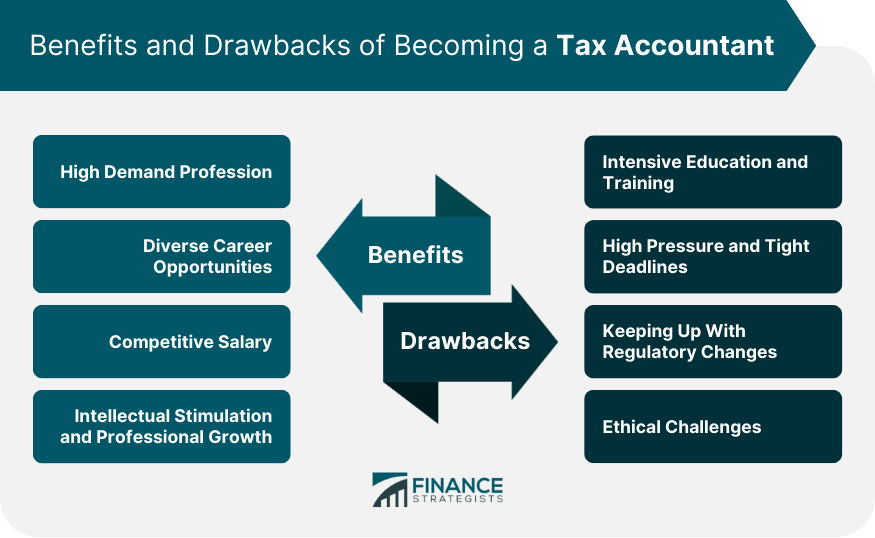A tax accountant is a finance professional who specializes in assisting individuals and businesses with their tax return preparation and tax planning. This specialty lies within the broader field of accounting but with an intricate focus on tax laws and regulations. The purpose and importance of a tax accountant cannot be overstated. They play a critical role in advising clients on tax-related matters, ensuring tax compliance, minimizing tax liabilities, and maximizing benefits by interpreting and navigating the complexities of tax laws and regulations. The first step towards becoming a tax accountant typically involves obtaining a bachelor's degree in accounting or a related field. Coursework often includes subjects such as business law, management, economics, finance, and, of course, taxes. Many aspiring tax accountants also pursue a master's degree in taxation or business administration for specialized knowledge and an edge in the job market. After completing education requirements, prospective tax accountants commonly pursue licensure as Certified Public Accountants (CPAs). This process involves passing the Uniform CPA Examination and meeting state-specific requirements, which usually include a specific amount of work experience. Additionally, some tax accountants may choose to earn certifications like Certified Tax Coach (CTC) or Enrolled Agent (EA) to further specialize their skills. Hands-on experience in tax preparation, tax planning, and dealing with tax issues is vital for any aspiring tax accountant. This experience is often gained through internships, entry-level jobs, or by working under the supervision of experienced accountants. Besides technical knowledge and qualifications, a tax accountant needs a range of skills, including attention to detail, organizational skills, analytical ability, and excellent communication skills. These professionals must interpret and explain complex tax regulations to clients who have little to no understanding of tax law. Tax laws change frequently, so tax accountants must stay updated to serve their clients effectively. This requirement for continuous learning is why many professionals attend conferences, seminars, and workshops and subscribe to professional journals and publications. A tax accountant must have an intricate understanding of local, state, and federal tax laws. They use this knowledge to ensure their clients comply with all relevant laws and regulations while minimizing their tax obligations. Preparing tax returns is a primary responsibility of a tax accountant. This task involves calculating income, deductions, credits, and taxes for individuals, businesses, and organizations. Tax accountants also advise clients on tax-efficient strategies. These may include recommending tax-advantaged investments or timing income and expenses in a way that reduces tax liability. Tax accountants ensure clients' compliance with tax laws by keeping track of deadlines, filing returns, and ensuring payments are made on time. They also consult on issues like tax implications of business decisions and strategies to manage tax audits. Tax accountants are always in demand due to the complexity and ever-changing nature of tax laws. Every individual and business, regardless of size, has a tax obligation, creating a continuous need for tax accountants. A career in tax accounting can open up diverse opportunities. Tax accountants can work in public accounting firms, corporations, and government agencies or even start their own practice. Tax accountants often command competitive salaries due to their specialized knowledge and the critical nature of their work. The ever-changing landscape of tax laws and regulations ensures that tax accountants are continuously learning and growing professionally. This constant learning makes the profession intellectually stimulating. Becoming a tax accountant requires a significant investment of time and effort in education and training. This path can be challenging, but it's necessary to become a skilled professional in the field. The tax accounting profession often involves high pressure, particularly during tax season when tight deadlines are common. Tax accountants must stay current with the frequent changes in tax law. This necessity can be challenging, especially with large-scale reforms. Tax accountants must navigate ethical challenges. They must balance their duty to minimize clients' tax liabilities with their responsibility to comply with the law. Adopting a Detail-Oriented Approach: Tax accounting is a detail-oriented profession. Precision is vital, as minor errors can have significant implications. Continuous Learning: To excel as a tax accountant, one must commit to continuous learning. Staying updated with the latest tax laws, regulations, and strategies is essential. Building a Strong Professional Network: Successful tax accountants often have a strong professional network. Building relationships with other finance professionals can provide opportunities for collaboration, learning, and growth. Staying Abreast of Industry Trends and Changes: Keeping an eye on industry trends and changes can help tax accountants provide the best service to their clients and stay competitive in the job market. Becoming a tax accountant requires extensive education, a firm grasp of ever-changing tax laws, and a dedication to meticulous work. A tax accountant plays an essential role in society by assisting individuals and businesses with their tax obligations and strategies, ensuring compliance, and offering advice to reduce liabilities and maximize benefits. This profession, although demanding and challenging, offers a stimulating career with diverse opportunities and competitive remuneration. Furthermore, it presents an environment that fosters continuous learning and professional growth. Aspiring tax accountants need to cultivate key skills, such as attention to detail, analytical abilities, and strong communication skills. Success in this field is achieved not just through technical proficiency but also by building a robust professional network and staying updated with industry trends and changes. Despite the challenges, the field of tax accounting remains a fulfilling and rewarding career choice.What Is a Tax Accountant?
Process of Becoming a Tax Accountant
Education Requirements
Licensure and Certifications
Gaining Experience
Skills and Abilities
Continuous Learning and Professional Development

Roles and Responsibilities of a Tax Accountant
Detailed Understanding and Application of Tax Law
Preparation of Tax Returns
Tax Planning and Strategy
Compliance and Consultation

Benefits of Becoming a Tax Accountant
High Demand Profession
Diverse Career Opportunities
Competitive Salary
Intellectual Stimulation and Professional Growth
Drawbacks and Challenges in Becoming a Tax Accountant
Intensive Education and Training
High Pressure and Tight Deadlines
Keeping Up With Regulatory Changes
Ethical Challenges

How to Excel as a Tax Accountant
Bottom Line
How to Become a Tax Accountant FAQs
To become a tax accountant, you typically need a bachelor's degree in accounting or a related field. Afterward, many individuals choose to become Certified Public Accountants (CPAs), which involves passing the Uniform CPA Examination and meeting state-specific work experience requirements. Additional certifications, such as the Certified Tax Coach (CTC) or Enrolled Agent (EA), may be pursued for further specialization.
A tax accountant's primary responsibilities include understanding and applying tax law, preparing tax returns, advising on tax-efficient strategies, and ensuring clients' compliance with tax laws. They also provide consultation services regarding tax implications of business decisions and strategies for managing tax audits.
Becoming a tax accountant comes with several benefits. These professionals are always in high demand due to the complexity and ever-changing nature of tax laws. The career provides diverse opportunities, allowing accountants to work in various settings such as public firms, corporations, or government agencies. It offers competitive salaries and continuous professional growth due to the dynamic nature of tax laws and regulations.
The path to becoming a tax accountant involves intensive education and training, which can be challenging. Once in the field, you can expect high-pressure situations, especially during tax season when dealing with tight deadlines. The profession requires staying updated with frequent changes in tax law and occasionally navigating ethical dilemmas related to tax liabilities and legal compliance.
To excel as a tax accountant, you must adopt a detail-oriented approach, as precision is crucial in this profession. Committing to continuous learning, building a strong professional network, and staying abreast of industry trends and changes will help you provide the best service to your clients and remain competitive in the job market.
True Tamplin is a published author, public speaker, CEO of UpDigital, and founder of Finance Strategists.
True is a Certified Educator in Personal Finance (CEPF®), author of The Handy Financial Ratios Guide, a member of the Society for Advancing Business Editing and Writing, contributes to his financial education site, Finance Strategists, and has spoken to various financial communities such as the CFA Institute, as well as university students like his Alma mater, Biola University, where he received a bachelor of science in business and data analytics.
To learn more about True, visit his personal website or view his author profiles on Amazon, Nasdaq and Forbes.











